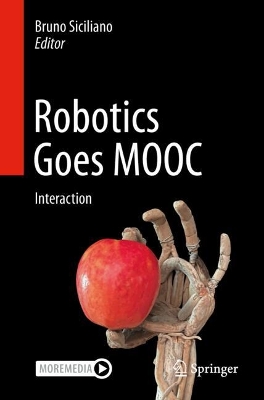Human-Computer Interaction. Theories, Methods, and Human Issues
 -15%
portes grátis
-15%
portes grátis
Human-Computer Interaction. Theories, Methods, and Human Issues
20th International Conference, HCI International 2018, Las Vegas, NV, USA, July 15-20, 2018, Proceedings, Part I
Kurosu, Masaaki
Springer International Publishing AG
06/2018
617
Mole
Inglês
9783319912370
15 a 20 dias
979
Descrição não disponível.
HCI Theories, methods and tools.- What are User Requirements? Developing an ISO Standard.- UCD: influenced by an organizational culture and its maturity.- A Landscape of Design: Interaction, Interpretation and the Development of Experimental Expressive Interfaces.- InterArt: Learning Human-Computer Interaction Through the Making of Interactive Art.- UX Evaluation Design of UTAssistant: A New Usability Testing Support Tool for Italian Public Administrations.- The Development of Individuals' Competencies as a Meaningful Process of the Audiovisual Design Methodology.- How to Bring the 'Myth' of Cultural Awareness into Enterprise Software - Challenges and Approaches.- A Method to Make an Existing System Adaptive.- Towards an integrated approach to studying virtual reality-mediated social behaviors.- Tool-mediated HCI Modeling Instruction in a Campus-based Software Quality Course.- Approaches to Interface Icon Classification.- User Experience Evaluation by ERM: Experience Recollection Method.- Don't Leave Me Alone: Retrospective Think Aloud supported by Real-time Monitoring of Participant's Physiology.- From Design Fiction to Design Fact: developing future user experiences with proto-tools.- What's the Impact of Local Cultures on the User Experience of Software Solutions?.- How is User Research Essential in making E-Government Accessible to All?.- Addressing IoT - Towards Material-Centered Interaction Design.- Evaluation of Visualization Heuristics.- The Temporal-Spatial Metaphorical Expression Difference in Spatial Schema Design.- Perception and psychological issues in HCI.- "I'm not stupid" - Attitudes Towards Adaptation Among People with Dyslexia.- Research on Sticker Cognition for Older Adult Using Instant Messaging.- Cognitive Offloading and the Extended Digital Self.- Deconaby: Animations for Improving Understandability of Web Images.- Study on Children's Toy Design Based on Perceptual Evaluation.- User performance for vehicle recognition with visual and infrared sensors from an unmanned aerial vehicle.- Reading Machine-Written News: Effect of Machine Heuristic and Novelty on Hostile Media Perception.- Courting the Visual Image: The Ability of Digital Graphics and Interfaces to Alter the Memory and Behaviour of the Viewer.- Impact of the size of Chinese Characters on the Visual Search Performance Under Vibration.- Image Blurring Method for Enhancing Digital Content Viewing Experience.- Characterizing the EEG Features of Inspiring Designers with Functional Terms.- Emotion and attention recognition.- Speech Emotion Recognition Integrating Paralinguistic Features and Auto-encoders in a Deep Learning Model.- Deep Learning based Video Spatio-Temporal Modeling for Emotion Recognition.- A Flexible, Low Power, Compact, Mobile Sensor for Emotion Monitoring in Human Computer Interaction.- Multimodal Paradigm for Emotion Recognition based on EEG signals.- Automatic low-level overlays on presentations to support regaining an audience's attention.- Experimental Induction and Measurement of Negative Affect Induced by Interacting with In-vehicle Information Systems.- Measurement of JND Thresholds and Riemannian Geometry in Facial Expression Space.- A System for Non-Intrusive Affective Assessment in the Circumplex Model from Pupil Diameter and Facial Expression Monitoring.- Security, privacy and ethics in HCI.- A Model for Regulating of Ethical Preferences in Machine Ethics.- Towards Collecting and Linking Personal Information for Complete Personal Online Identity Modelling.- Towards an Ethical security platform.- PassHue: Introducing Analog Authentication.- A Hand Gesture-Based Method for Biometric Authentication.- HCI Patterns for Cryptographically Equipped Cloud Services.- Why Users Ignore Privacy Policies - A Survey and Intention Model for Explaining User Privacy Behavior.- Digital Breadcrumbs: A Lack of Data Privacy and What People are Doing About It.
Este título pertence ao(s) assunto(s) indicados(s). Para ver outros títulos clique no assunto desejado.
artificial intelligence;computer networks;computer vision;data communication systems;data security;facial expressions;gesture recognition;Human-Computer Interaction (HCI);interactive computer graphics;internet;mobile computing;mobile devices;privacy;robots;semantics;telecommunication networks;ubiquitous computing;usability engineering;usability evaluation;user interfaces
HCI Theories, methods and tools.- What are User Requirements? Developing an ISO Standard.- UCD: influenced by an organizational culture and its maturity.- A Landscape of Design: Interaction, Interpretation and the Development of Experimental Expressive Interfaces.- InterArt: Learning Human-Computer Interaction Through the Making of Interactive Art.- UX Evaluation Design of UTAssistant: A New Usability Testing Support Tool for Italian Public Administrations.- The Development of Individuals' Competencies as a Meaningful Process of the Audiovisual Design Methodology.- How to Bring the 'Myth' of Cultural Awareness into Enterprise Software - Challenges and Approaches.- A Method to Make an Existing System Adaptive.- Towards an integrated approach to studying virtual reality-mediated social behaviors.- Tool-mediated HCI Modeling Instruction in a Campus-based Software Quality Course.- Approaches to Interface Icon Classification.- User Experience Evaluation by ERM: Experience Recollection Method.- Don't Leave Me Alone: Retrospective Think Aloud supported by Real-time Monitoring of Participant's Physiology.- From Design Fiction to Design Fact: developing future user experiences with proto-tools.- What's the Impact of Local Cultures on the User Experience of Software Solutions?.- How is User Research Essential in making E-Government Accessible to All?.- Addressing IoT - Towards Material-Centered Interaction Design.- Evaluation of Visualization Heuristics.- The Temporal-Spatial Metaphorical Expression Difference in Spatial Schema Design.- Perception and psychological issues in HCI.- "I'm not stupid" - Attitudes Towards Adaptation Among People with Dyslexia.- Research on Sticker Cognition for Older Adult Using Instant Messaging.- Cognitive Offloading and the Extended Digital Self.- Deconaby: Animations for Improving Understandability of Web Images.- Study on Children's Toy Design Based on Perceptual Evaluation.- User performance for vehicle recognition with visual and infrared sensors from an unmanned aerial vehicle.- Reading Machine-Written News: Effect of Machine Heuristic and Novelty on Hostile Media Perception.- Courting the Visual Image: The Ability of Digital Graphics and Interfaces to Alter the Memory and Behaviour of the Viewer.- Impact of the size of Chinese Characters on the Visual Search Performance Under Vibration.- Image Blurring Method for Enhancing Digital Content Viewing Experience.- Characterizing the EEG Features of Inspiring Designers with Functional Terms.- Emotion and attention recognition.- Speech Emotion Recognition Integrating Paralinguistic Features and Auto-encoders in a Deep Learning Model.- Deep Learning based Video Spatio-Temporal Modeling for Emotion Recognition.- A Flexible, Low Power, Compact, Mobile Sensor for Emotion Monitoring in Human Computer Interaction.- Multimodal Paradigm for Emotion Recognition based on EEG signals.- Automatic low-level overlays on presentations to support regaining an audience's attention.- Experimental Induction and Measurement of Negative Affect Induced by Interacting with In-vehicle Information Systems.- Measurement of JND Thresholds and Riemannian Geometry in Facial Expression Space.- A System for Non-Intrusive Affective Assessment in the Circumplex Model from Pupil Diameter and Facial Expression Monitoring.- Security, privacy and ethics in HCI.- A Model for Regulating of Ethical Preferences in Machine Ethics.- Towards Collecting and Linking Personal Information for Complete Personal Online Identity Modelling.- Towards an Ethical security platform.- PassHue: Introducing Analog Authentication.- A Hand Gesture-Based Method for Biometric Authentication.- HCI Patterns for Cryptographically Equipped Cloud Services.- Why Users Ignore Privacy Policies - A Survey and Intention Model for Explaining User Privacy Behavior.- Digital Breadcrumbs: A Lack of Data Privacy and What People are Doing About It.
Este título pertence ao(s) assunto(s) indicados(s). Para ver outros títulos clique no assunto desejado.
artificial intelligence;computer networks;computer vision;data communication systems;data security;facial expressions;gesture recognition;Human-Computer Interaction (HCI);interactive computer graphics;internet;mobile computing;mobile devices;privacy;robots;semantics;telecommunication networks;ubiquitous computing;usability engineering;usability evaluation;user interfaces







